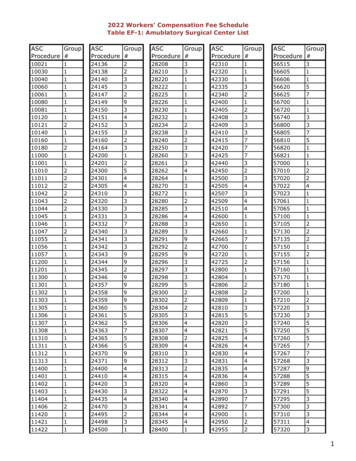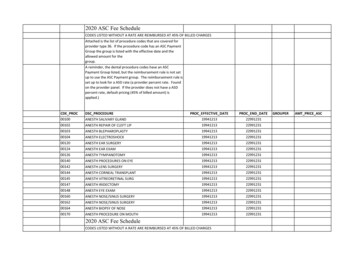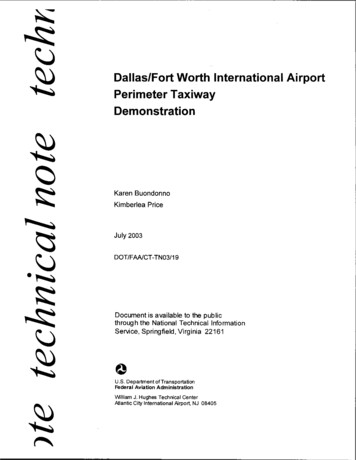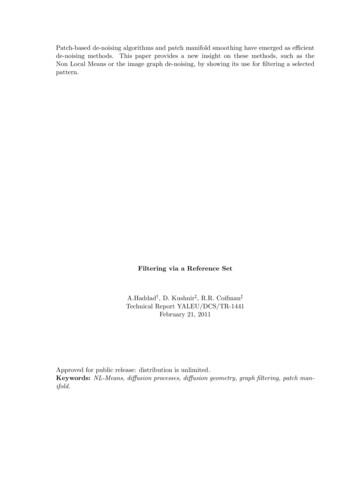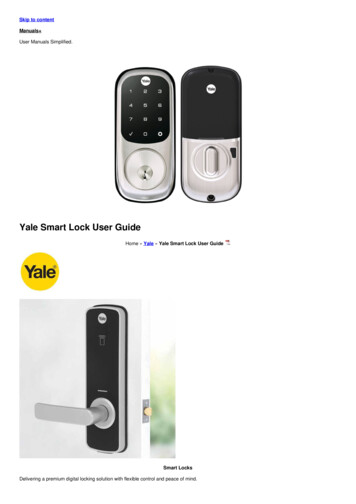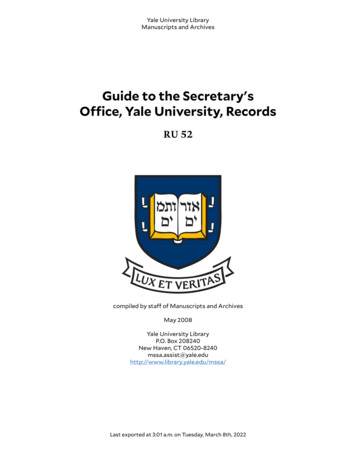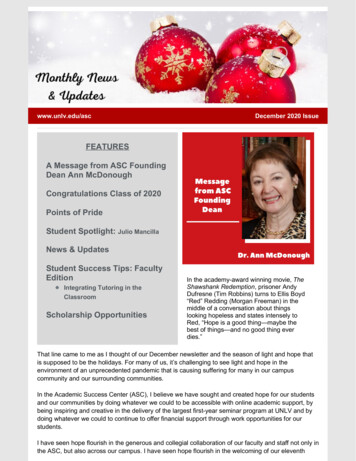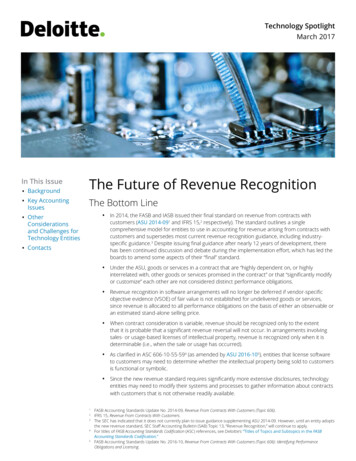
Transcription
ASC Orientationtable of contentsThis is an interactive, click-driven guide. Where can we take you?General Information for: Members » Directors »Content Guide: Members Alumni Schools Committee »Clicking on any of the categories andsub-categories will take you directly to thesection you’re looking for. Calendar » Membership Roles » Ethical Considerations » Mission » Eligibility » Structure » Ivy Best Practices » Portal » Interviews » Interviews with Tech »Clicking this icon willbring you back to theTable of Contents. Admissions » Highly Selective » Class of 2023 Profile » Application » Application Types » Rounds »Spring Yield Programming »Calendar »Financial Aid »Interviews » Calendar » Sample Reports » Conduct » Scheduling » Portal » Venue » Reports » Interviews with Tech » Sample Questions » What do we want to know » Portal » Rounds, Application » Early Action » Regular Decision » Statistics » Class of 2023 Profile »Content Guide: Directors Calendar » Communications » Challenges » Events » Logistics of Interviews » Portal » Interview Assignments » Role » Stewardship » Recruitment » Training » Financial Aid »Table ofContents»
Overview for MembersThis resource is intended to give ASC members a quick overview of the ASC Program to help get you started withthe 2020-2021 application cycle. We encourage you to visit the ASC Orientation for in-depth coverage of theASC Program and the interviewing cycle.Overview of the ASCThe ASC is a network of alumni volunteers who share a passion for Yale and conduct interviews on behalf of Undergraduate Admissionswith the goals of:1. Providing crucial information about applicants to Yale so that the admissions committee can make better decisions as it shapes thefirst-year class; and2. Establishing a Yale presence that educates the local applicants and community about Yale’s unique opportunities, values, andcharacter.The ASC consists of:5,860committees that s from all14institutions at Yale Universityactive volunteerswho span EIGHTdecades, from theYale Classes of1942to2020The Interviewing Process1student submits anapplication to theadmissions office2The process of completing an alumni interview involves severalphases and action items. The following diagram outlines thesephases, as well as key pieces of information that provide deeperguidance at each step of the process. We hope you enjoyconducting interviews for the ASC Program!Why Your Work is Importantasc director receivesnotification thatapplicants are availablefor interviewsAmbassadorship: In many cases, the interview may be the only time the applicants havedirect contact with a Yale community member. As a result, the interview can be an influentialmoment for the applicant, even beyond the application process. Your interaction with applicants can illuminate the University’s strengths and ethos, and for admitted students, it maycontribute significantly to their choosing us over other attractive options.3Interviews: Perceptive written impressions help the Admissions Committee envision thepersonal and intellectual qualities that may make some high-achieving students stand outamong others. Additionally, your reports can lend important context for the applicant. Theinterview report remains one of the few documents that provides a window into a spontaneous interaction with the applicant. As a result, they are some of the most frequently vieweddocuments in our Admissions Committee.asc director assignsinterviewers fromavailable volunteers
4the assigned volunteerreceives notificationof an interview requestvia email and confirmsthe request5Where/How To Conduct InterviewsInterviews tend to last between 30 minutes to 45 minutes. Anything shorter than that maymiss out on important information; anything longer may feel exhausting. Due to the everevolving impact of the COVID-19 pandemic, all interviews for the 2020-2021admissions cycle must take place virtually, regardless of country or regional socialdistancing guidelines. A variety of platforms are available, including: Zoom Skype FaceTime Google Hangoutsthe volunteerschedules theinterview and meetsthe applicantYale will NOT reimburseinterviewers for phone calls madein service of the ASC program.Please reach out to our office, if youcannot reach the student throughany other method.Guidelines for Writing Interview Reports6The impressions you form through the interview may provide key insights as we shape theclass. While there is no set format for interview reports, here are a few examples of themesyou may learn from the interviews:the volunteer writesthe interview report Intellectual strengths and energyAcademic interestsFlexibility in thinking, opennessExpressive abilities Nonacademic interests or talents Personal qualities Distinctive or unusual talentsand/or circumstancesYale interviews are meant to be conversations rather than interrogations, where applicantslearn about Yale even as volunteers are learning about applicants. Expect applicants to askabout your own Yale experiences; they’re just as curious as you are! Ultimately, we hope theinterview is a meaningful interaction for both the student and the volunteer.7the volunteer submitsthe report throughthe asc portalQuick Tips We recommend completing your reports within 48-72 hours of the interview. If you have a problem completing an interview, let your ASC Director know right away. Pleasestill submit a report if a student declines the interview or is unresponsive to your messages. Applicants may ask questions to which you do not know the answer. That’s okay! Feel free todirect them to the admissions office for accurate information at asc@yale.edu.Important Dates and Additional ResourcesPlease keep the following dates and additional resources in mind during your work as an interviewer: November 1st: Early Action application deadline. While some interviews may happen beforethis date, this is the official kick-off of the interviewing season. December 1st: Deadline for Early Action interview reports January 2nd: Regular Decision application deadline. February 15th: Deadline for all interview reports
ASC Orientationorientation for membersWhat is the Alumni Schools Committee (ASC)?The ASC is a network of alumni volunteers who share a passion for Yale and conduct interviews on behalf ofUndergraduate Admissions with the goals of: Providing crucial information about applicants to Yale so that the admissions committee can makebetter decisions as it shapes the first-year class, and Establishing an ambassadorial presence that educates the local applicants and community about Yale’sunique opportunities, values, and character.?Y*?Y*Welcome!?Y*we are looKing for yalealumni.from all across theworld.to meet and interview localprospective students.and to recruit thenewest class of yalies!Why your work is importantAmbassadorship: As a member of the ASC, you play a substantial ambassadorial role on Yale’s behalf. Yourinteraction with applicants can advance Yale’s reputation in general, and for admitted students, it may contribute significantly to their choosing us over other attractive options. Through your interactions with prospective students and their families, you illuminate the University’s strengths and ethos. In many cases, theinterview may be the only time the applicants have direct contact with a Yalecommunity member. As a result, the interview can be an influential momentBeyond the interview:for the applicant, even beyond the college application process.Interviews: Your interviews and written summaries are more important thanever. With so many applicants—and many presenting similar academic andextracurricular profiles—the Admissions Committee appreciates perceptive,vivid written impressions to envision the personal and intellectual qualitiesthat may make some high-achieving students stand out among others. Additionally, your reports can lend important context for the applicant. Theinterview report remains one of the few documents that provides a windowinto a spontaneous interaction with the applicant. As a result, they are someof the most frequently viewed documents in our Admissions Committeemeetings, flashed up on a big screen so that all members of the committee canread them. Represent Yale atregional admittedstudent receptions Represent Yale at virtual"Send-Offs" for admittedstudentsTable ofContents»
ASC Orientationorientation for membersWho is eligible to join the ASC?Any Yale College or Yale graduate or professional school alumni can join the ASC. Please review our sections onEthical Considerations and eligibility as established by Ivy Best Practices for additional details.Yale Undergraduate Admissions & ASC structureDean&Director23 AdmissionOfficers240 ASC Directors6,000 ASC Members18,000representatives from allinterviewscompleted annually14institutions atYale Universitycommittees that encompass55countries&50U.S. statesTable ofContents»
ASC Orientationorientation for membersRewards and ambassadorshipWhy is the ASC rewarding?ASC members universally say that the biggest rewards of volunteering come from the one-on-one conversations with Yale hopefuls. Many of them are impressive because of their accomplishments or their engaging personalities. But even when you meet students with less dazzling attributes, the encounters can beendearingly memorable – in fact, your reports may help illuminate qualities that otherwise would not haveemerged in their applications.A few words about ambassadorshipFor many applicants, alumni interviews are the first contact with the colleges they are exploring. You maybe the face of Yale University for many applicants you meet, so your role is significant, perhaps momentous for a student who discovers the best of Yale through you. We often hear from students who say theirinterviewer was a key influence in their decision to enroll. We like to think that even those who decide toenroll elsewhere, or who are not admitted, nevertheless have very positive feelings about Yale because oftheir interviewer.The heart of the ASC Program lies in our ability to be ambassadors for Yale. While we must be realisticabout the admission rate, we can contribute to students’ positive feelings about Yale. In fact, your ambassadorship on the University’s behalf may ultimately contribute more significantly to Yale than your assessment of any single applicant. A student might find his meeting with you to be so comfortable, so engaging,and so sincere that he sees Yale’s tangible and intangible strengths through you. And we never underestimate the positive ripple effect that can result from a good interview experience—even if the student isn’tadmitted. When applicants tell their families, counselors, and classmates about their engaging Yale interviewer, those impressions influence the thinking of other candidates and their supporters.Interview workflowHow do students apply?In order to be eligible for an interview, freshmen applicants must complete the Common Application,the Coalition Application, or the QuestBridge National College Match Application, all available online.Application Rounds:Single Choice Early Action (EA)Regular Decision (RD)Deadline: November 1stDeadline: January 2ndDecision Release: mid-DecemberDecision Release: late-MarchThe plan is non-binding, meaning thatcandidates who are admitted early need notrespond to the offer of admission untilMay 1, and may apply to other schoolsduring Regular Decision.The decision release date is set by the IvyLeague admissions deans as the Ivies releasetheir
Yale Classes of 1942 to 2020 The Interviewing Process 1 asc director receives notification that applicants are available for interviews 2 asc director assigns interviewers from available volunteers 3 The process of completing an alumni interview involves several phases and action items. The following diagram outlines these

